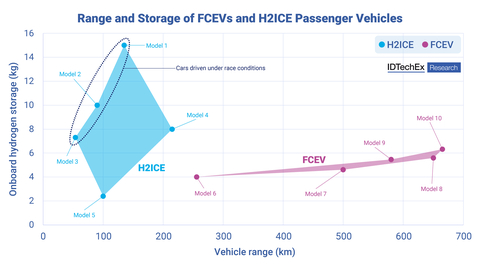
Volume and Not Weight Rule out Hydrogen Combustion for Passenger Cars, Reveals IDTechEx Research
Published by Todd Bush on September 4, 2024
Hydrogen internal combustion engines (H2ICE) promise (almost) zero emissions transport without relying on expensive, slow-to-recharge batteries. As hydrogen is a carbon-neutral fuel, H2ICE offers an opportunity to retain the combustion engine in an increasingly zero-emissions world. OEMs and suppliers can apply minor modifications to existing engine and vehicle production lines and produce carbon-neutral vehicles that retain many characteristics of existing ICEs.

IDTechEx has analyzed the performance and storage of various H2ICE and FCEV models. The results indicate that H2ICE consumes more fuel (kg H2/100km).
>> In Other News: BP Energy Partners Announces the Sale of MIRATECH, a Market Leader in Emissions Reduction Technology & Compliance Solutions
So, does the hydrogen combustion engine offer a viable route to continuing ICE vehicle production? According to IDTechEx’s new “Hydrogen Internal Combustion Engines 2025-2045: Applications, Technologies, Market Status and Forecasts” report, the answer is, at least for cars, no. But why?
Hydrogen is the most abundant element in the universe and is also the lightest. When combusted in the presence of oxygen, hydrogen releases a huge amount of energy—around 39.3kWh per kg. In comparison, a kilogram of diesel contains 12.6kWh. This might suggest that hydrogen is a wonder fuel, able to store huge quantities of energy and enable hydrogen-powered vehicles to travel enormous distances without needing large storage tanks. This is only half true, and weight is only part of the problem. The big issue is volume.
While hydrogen has a high gravimetric energy density, it has a very low volumetric energy density, about 3,000 times less than diesel at atmospheric pressure. To get useful amounts of energy, hydrogen must be stored as a compressed gas, typically at 350- or 700-times atmospheric pressure. Even in its most dense form (liquid), hydrogen contains just 26% of the energy per volume as diesel.
The drivable range also factors in the energy efficiency of a vehicle. This is where H2ICE falters compared with its hydrogen counterpart, the fuel cell electric vehicle (FCEV), which travel further on the same amount of hydrogen than an H2ICE vehicle.
IDTechEx has analyzed the real-world performance of various H2ICE and FCEV vehicles to assess fuel consumption, and the results clearly show that FCEVs are more fuel-efficient. For a passenger car to run on hydrogen combustion and achieve a range comparable to a petrol/diesel ICE, it would need an enormous storage vessel – a tank 3.5x larger would be required to contain the same energy content.
IDTechEx’s report explores some of the sectors where these challenges are less pronounced, and the case for H2ICE is much stronger. For passenger cars, however, the future seems set to be electric.
To find out more about the new IDTechEx report, please visit www.IDTechEx.com/H2ICE. Downloadable sample pages are available.
For the full portfolio of hydrogen market research available from IDTechEx, please see www.IDTechEx.com/Research/Hydrogen.
About IDTechEx
IDTechEx provides trusted independent research on emerging technologies and their markets. For more information, contact research@IDTechEx.com or visit www.IDTechEx.com.
Subscribe to the newsletter
Daily decarbonization data and news delivered to your inbox
Follow the money flow of climate, technology, and energy investments to uncover new opportunities and jobs.
Latest issues
-
This $4.1M Deal Could Change Carbon Capture's Playbook
Inside This Issue 🗜️ CarbonQuest Lands $4.1M Alberta Deal on Gas Compressors 🛡️ CADO, 123Carbon, and Assure SAF Registry Join Forces to Tackle SAF Integrity Gaps ✈️ ISCC, OMV, and Airbus Partner t...
-
Can Koloma Crack Iowa's Billion-Year-Old Secret?
Inside This Issue ⛏️ Iowa's Hydrogen Rush: Can Koloma Strike Gold Before Rules Kick In? ✈️ Bentley Commits to Use 100% Sustainable Aviation Fuel for Car Airfreight 🌬️ Minister Parrott Provides Upd...
-
$47M Just Poured Into This SAF Producer
Inside This Issue 💰 LanzaJet Announces $47M in New Capital and First Close of Equity Round at $650M Pre-Money Valuation 🚢 Maersk's Ethanol Bet Could Reshape U.S. Fuel Markets 🪨 Canada Nickel and t...
Company Announcements
-
Feedstocks are Perennial Grasses and other Renewable Biomass Sources FREDERICK, Md., Feb. 18, 2026 /PRNewswire/ -- Do you know why passenger and freight planes are not using renewable biofuel? It'...
-
Vancouver, British Columbia--(Newsfile Corp. - February 25, 2026) - Q Precious & Battery Metals Corp. (CSE: QMET) (OTC Pink: BTKRF) (FSE: 0NB) ("QMET" or the "Company") congratulates Quebec Inn...
-
Carbon Direct and C2X Announce Collaboration on Pioneering Forestry Residue-to-Biofuel Project
Collaboration on C2X’s Beaver Lake Biofuels project advances biomass carbon removal and storage as a scalable climate solution, transforming Louisiana’s forestry and sawmill residues into biofuel a...
-
Carbon Direct and C2X Announce Collaboration on Pioneering Forestry Residue-to-Biofuel Project
Collaboration on C2X’s Beaver Lake Biofuels project advances biomass carbon removal and storage as a scalable climate solution, transforming Louisiana’s forestry and sawmill residues into biofuel a...